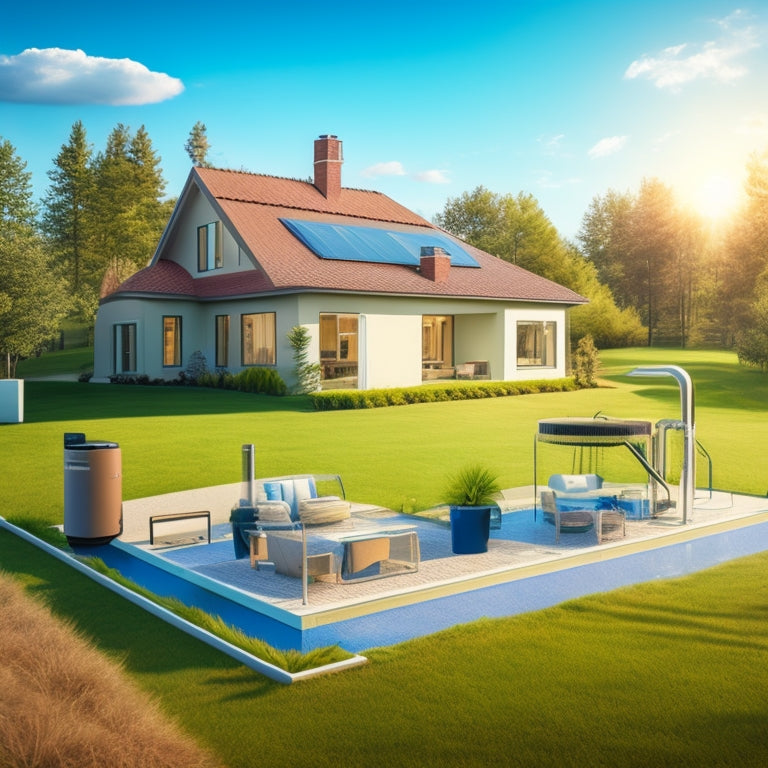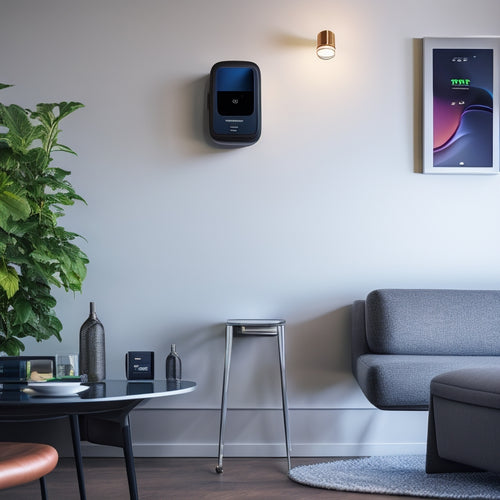
Installing Geothermal Heat Pumps: Costs and Steps Explained
Share
When installing a geothermal heat pump, you'll face various costs and steps. Component costs include the ground loop ($2,000 to $10,000), heat pump unit ($3,000 to $7,000), and heat exchanger ($1,000 to $3,000). Labor costs depend on installation techniques, market conditions, and complexity. Drilling and digging expenses vary by technology and site assessment. System size and complexity, as well as additional installation expenses like permits and site assessments, also impact the overall cost. To get a more accurate estimate and steer through the installation process, you'll need to evaluate these factors and understand how they intersect.
Key Takeaways
- Geothermal system components, including ground loops, heat pumps, and heat exchangers, can cost between $6,000 and $20,000.
- Installation labor costs vary depending on techniques, market conditions, complexity, and contractor experience, affecting overall project expenses.
- Drilling and digging expenses are influenced by drilling technology, site assessment, borehole number and depth, and hazardous waste disposal costs.
- System size and complexity impact efficiency, with ideal system design crucial for maximizing efficiency and minimizing environmental impact.
- Additional installation expenses include permit fees, site assessments, landscaping, and restoration, which can add $2,500 to $6,000 to the total cost.
Geothermal System Components Costs
You're likely curious about the cost of the different components that make up a geothermal heat pump system. The ground loop, which consists of underground pipes, accounts for a significant portion of the overall cost, ranging from $2,000 to $10,000.
To minimize energy waste and reduce operating costs, it's crucial to select energy-efficient equipment and optimize system design. The heat pump unit itself, responsible for transferring heat, can cost between $3,000 to $7,000.
Additionally, you'll need to examine the cost of the heat exchanger, which can range from $1,000 to $3,000. It's vital to evaluate component lifespan, as well as efficiency ratings, when selecting these components. A longer-lasting component may be more expensive upfront but can provide long-term savings.
Look for components with high efficiency ratings to maximize your system's performance and reduce energy costs.
Installation Labor Cost Factors
Having selected the components for your geothermal heat pump system, it's now important to evaluate the labor costs associated with installation.
You'll need to assess the installation techniques used by the contractor, as they can greatly impact the overall labor cost. For example, a contractor with experience in horizontal loop installations may charge less than one with limited skill.
The labor market in your area also plays a crucial role, as contractors in high-demand areas may charge more for their services. Additionally, the complexity of the installation, such as the need for additional piping or electrical work, can increase labor costs.
Moreover, investing in renewable energy sources, such as solar-powered charging stations, can future-proof your business and enhance your eco-friendly reputation.
Drilling and Digging Expenses
Drilling and digging expenses constitute a significant portion of the overall geothermal heat pump installation cost.
You'll need to factor in the cost of drilling boreholes for your underground piping, which can vary depending on the drilling technology used and the site assessment. The type of drilling method, such as rotary drilling or percussive drilling, will impact the cost.
Additionally, the number of boreholes required, their depth, and the complexity of the drilling process will also influence the expense. Understanding the costs associated with hazardous waste disposal and responsible waste handling practices can help minimize environmental impact and guarantee regulatory compliance.
A thorough site assessment will help determine the most suitable drilling method and reduce potential risks, ultimately affecting the overall cost of the project.
Be prepared to invest in high-quality drilling equipment and experienced operators to guarantee a successful installation.
System Size and Complexity
As the drilling and digging process sets the stage for your geothermal heat pump installation, it's equally important to evaluate the system's size and complexity.
You'll need to determine the ideal system size to guarantee maximum system efficiency. A thorough site assessment will help you identify the unique characteristics of your property, including the layout, soil type, and groundwater availability. This information will guide your decision on the number of boreholes, piping layout, and pump configuration.
Additionally, considering energy storage systems can also enhance grid resiliency and improve charging efficiency, which is vital for renewable energy systems like geothermal heat pumps.
A well-designed system won't only reduce energy consumption but also minimize environmental impact. By considering these factors, you'll be able to create a bespoke system that meets your specific needs and maximizes your return on investment.
Additional Installation Expenses
Determine your budget for the project by factoring in additional installation expenses that can add up quickly.
These costs can vary depending on your location, site conditions, and local regulations. It's crucial to evaluate the complexity of the installation, as it can influence the overall cost, similar to commercial EV charging station installation costs.
Additionally, permits and electrical upgrades can also impact the final expense.
To get an accurate estimate, assess the following expenses:
- Permit fees: You'll need to obtain permits from local authorities, which can range from $500 to $2,000.
- Site assessments: A site assessment is necessary to determine the feasibility of the project, and it can cost between $1,000 to $3,000.
- Landscaping and restoration: After the installation, you may need to restore your yard, which can add another $1,000 to $3,000 to your total cost.
Frequently Asked Questions
Can I Install a Geothermal Heat Pump Myself?
You can attempt a DIY installation, but consider the complexity and potential risks; without proper knowledge, you might compromise the system's efficiency or even void the warranty, ultimately affecting cost considerations and overall performance.
How Long Does a Geothermal System Typically Last?
You can expect a geothermal system to last around 20-30 years, with some units lasting up to 50 years, depending on your maintenance requirements, which include regular filter cleaning and occasional part replacements to guarantee ideal geothermal lifespan.
Are Geothermal Heat Pumps Noisy or Disruptive?
You wonder if geothermal heat pumps will disrupt your peaceful life with noise and chaos. Fear not, as they typically operate quietly, with minimal installation disruptions, and won't disturb your daily routine, ensuring you enjoy the freedom to live life uninterrupted.
Can Geothermal Systems Be Used for Cooling as Well?
You'll find that geothermal systems can indeed provide cooling benefits, utilizing the earth's natural temperature to enhance geothermal efficiency, allowing you to utilize the power of the earth to cool your space, achieving ideal comfort with minimal environmental impact.
Are There Any Government Incentives for Geothermal Installations?
You're literally showered with incentives! You'll uncover a wealth of government goodies, including lucrative tax credits, generous funding options, and installation grants, making your geothermal dreams a cost-effective reality, thanks to these enticing incentive programs.
Related Posts
-

10 Best WiFi Outlets for Tracking Home Energy Usage
You can optimize your home's energy usage with the right WiFi outlets, which provide real-time monitoring and control...
-

7 Best EV Battery Health Trackers for Homeowners
You can maximize your electric vehicle's performance and lifespan by leveraging advanced battery health trackers that...
-

Why Transform Human Waste Into Garden Gold?
By changing human waste into garden gold, you'll reduce waste management costs, support sustainable agriculture, and ...


